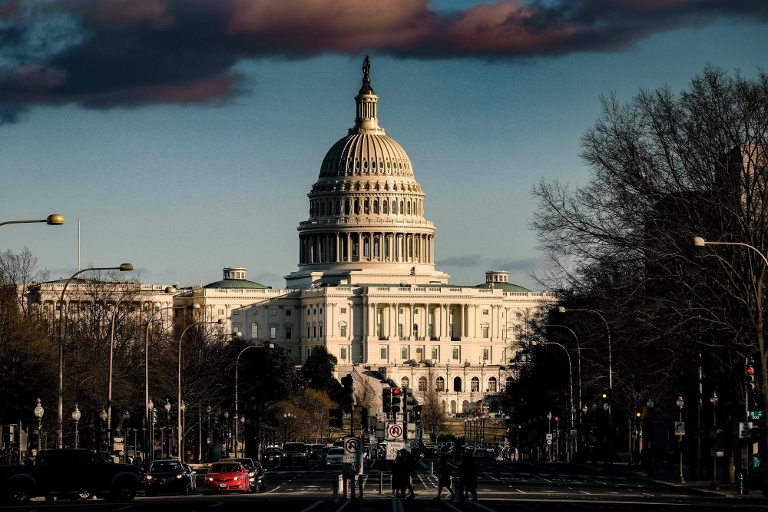Coal countries need not apply. United Nations Secretary-General Antonio Guterres drew praise Wednesday for taking what supporters called a “powerful stand” to address the climate crisis. Guterres will reportedly exclude major economies, including the United States, from talking at the upcoming U.N. Climate Action Summit because of their failure to produce appropriately ambitious climate plans and their ongoing support for coal. (Common Dreams)
Leslie Hook reported at the Financial Times Tuesday on the exclusions, citing a draft schedule of the summit, set take place Monday. Australia, Japan, South Korea, and South Africa will be snubbed over their continued support for coal. Brazil and Saudi Arabia, both of whom have criticized the Paris climate accord, will also be blocked. The Trump White House, which announced its plans to ditch the deal, will also not be afforded a speaking slot, Hook reported. (CBS News)
A gutsy and long overdue move.
Appropriations. Senate appropriators in charge of funding EPA and the Interior Department are trying to keep their bill from getting entangled in the growing impasse over fiscal 2020 spending.
Senators Lisa Murkowski (R-AK) and Tom Udall (D-NM), the chairwoman and ranking member of the Interior and Environment Subcommittee, said this week they are hoping to bypass the fight over “poison pill” riders through carefully negotiated language.
A chief Democratic criticism is Republicans diverting domestic spending to help build a wall along the U.S.-Mexico border.
The chamber voted 51-44 against moving forward with the so-called minibus package. Republicans needed at least 60 votes to take up the bill, which also included funding for the Pentagon.
Senate Appropriations Chairman Richard Shelby (R-AL) said he would continue to try to push through his committee as many of the 12 annual spending bills as possible.
Shelby also floated the prospect of a yearlong continuing resolution (CR), couching it as a warning to Democrats if they are not willing to cooperate. “If things don’t change, we might be creating an environment for a continuing resolution for a whole year,” he said. “I hope not, but I could see it.”
Among the programs set to be extended through Nov. 21 are the Export-Import Bank and National Flood Insurance Program, both were due to expire at the end of the month. (E&E News)
Hearings show a gap between messaging and reality. Greta Thunberg the Swedish climate activist, 16, declined to give a speech at a joint House hearing yesterday, opting instead to provide a copy of the U.N. Intergovernmental Panel on Climate Change Special Report on Global Warming released last year in lieu of testimony.
In the first of a series of hearings meant to spur policy considerations for their action plan to achieve net-zero emissions by 2050, House Democrats considered federal policy levers to help reduce emissions from the industrial sector.
Even though a broad, bipartisan consensus exists about the need for additional carbon capture deployment and other financial incentives for the sector, lawmakers are cognizant of the fear that too heavy a hand could drive manufacturing abroad as they were about climate impacts from the emissions.
“Poorly designed policies risk the leakage of pollution, production, and jobs overseas,” warned Environment and Climate Change Subcommittee Chairman Paul Tonko (D-NY).
“Our policy preferences should seek to both spur decarbonization and promote domestic, advanced manufacturing,” he added. “Rebuilding, retooling, and reinvigorating American manufacturing must be a fundamental component of our climate response.”
“I have to tell you my heart is pounding about this very high-level conversation because I’m not hearing the sense of urgency about this,” said Representative Jan Schakowsky (D-IL). “I’m hearing about incentives, I’m hearing about progress, but we are really and truly running out of time.”
A representative of the National Association of Manufacturers appeared before the panel with a caution that any policy directed by the federal government to reduce carbon emissions would have to make financial sense for their support.
“For manufacturers, the math really does matter,” said Ross Eisenberg, vice president of energy and resources policy with NAM, noting the tens of thousands of dollars manufacturers pay per employee for regulatory costs. (E&E News)
On the one hand it is good that these conversations are going on.
However, they are about decade late.
The issue of urgency is replacing the validity of the science-based evidence as the barrier that past opponents of the transition to a low-carbon economy will now be hiding behind.
It’s official. U.S. Environmental Protection Agency Administrator Andrew Wheeler and Transportation Secretary Elaine Chao said today their agencies will revoke the Clean Air Act waiver that has been used by California since 1967 to set its own emission standards. That would undo California’s Advanced Clean Car Rule, which calls for automakers to reduce pollution from new cars from 2012 model year levels by 40 percent by 2025. (Detroit News)
Beyond Trump’s hatred of all things California, the build-up to today’s formal announcement is designed to pressure the auto companies that didn’t follow the lead of Ford, Honda, Volkswagen and BMW in committing to the tougher California standard.
The administration has yet to confirm what standard it is proposing to establish—despite all the talk of freezing it at the 2020 levels.
I believe the administration is using it to dampen the response of the remaining car companies. Climate activists have become inured to any holding out of hope by this administration.
The president made us do it. The Interior Department approved a transfer of 560 acres of public land to the U.S. Army to build about 70 miles of the border wall, Secretary of the Interior David Bernhardt announced Wednesday.
The approved land, which spans parts of New Mexico, California, and Arizona, will not interfere with any national parks or segments of Native American land, according to the department’s announcement.
The move will surely add fuel to the border wall fire that’s already burning over appropriations.
Poll dancing/ 2 polls, no waiting. About 7 in 10 Americans think it is at least moderately likely the world will take action in the next decade to reduce emissions of heat-trapping carbon dioxide and other gases, but only about 3 in 10 think that’s very likely to happen, according to the August poll. (AP)
Poll 2. A majority of the public recognize the climate crisis as an “emergency” and say politicians are failing to tackle the problem, backing the interests of big oil over the wellbeing of ordinary people, according to an eight-country poll.
The survey, which comes before what is expected to be the world’s biggest climate demonstrations on Friday, found that climate breakdown is viewed as the most important issue facing the world, ahead of migration, terrorism, and the global economy, in seven out of the eight countries surveyed. In the US it comes third behind terrorism and affordable healthcare.
The poll surveyed more than 1,000 people in the UK, Canada, Germany, Italy, Brazil, France, Poland, and the US. (The Guardian)
As always, the question is whether feelings will lead to actions at the ballot box.
Worth the read. How energy companies corrupt state politics. Energy policy is often thought of as a national issue, rather than a state one. Because states partially regulate energy companies, climate activists have zeroed in on state governments as venues where they must make reforms soon. The complicating factor is the amount of money energy companies spend on state politics. (New Republic)
In play in 2020. E&E News has identified 31 House races — 16 Democratic and 15 Republican seats — where issues such as climate science denial, energy jobs, and chemical cleanups could become major points of contention for incumbents, their challengers or open-seat aspirants.
Democrats hold an 18-seat majority and are favored by several independent forecasters to retain the House next year. Their analysis shows that Republicans could make significant headway by winning races where green issues are vital factors.
The increased focus on a clean energy economy, environmental regulation, offshore drilling, and other similar concerns is driven in large part by freshmen who make up 13 of the 16 Democratic seats identified on this list.
Republican challengers in many cases are eager to tie freshmen in swing districts to Rep. Alexandria Ocasio-Cortez (D-N.Y.). First-term Democrats in the most competitive races have avoided explicitly endorsing the sweeping proposal for eliminating carbon emissions by 2030.
Are they right to fear? Across the country, teens are channeling their anxieties into activism. “Fear,” said Maryland 16-year-old Madeline Graham, an organizer of a student protest planned for this week, “is a commodity we don’t have time for if we’re going to win the fight.”
A solid majority of American teenagers are convinced that humans are changing Earth’s climate and believe that it will cause harm to them personally and to other members of their generation, according to a new Washington Post-Kaiser Family Foundation poll. Roughly 1 in 4 has participated in a walkout, attended a rally or written to a public official to express their views on global warming — a remarkable level of activism for a group that has not yet reached voting age. (Washington Post)
What’s the meaning of this? Five of the leading Democratic presidential hopefuls have not confirmed their participation in an MSNBC climate forum slated for this week.
Front-runner and former Vice President Joe Biden, Massachusetts Sen. Elizabeth Warren, former Texas Rep. Beto O’Rourke, California Sen. Kamala Harris and Minnesota Sen. Amy Klobuchar have not committed to being a part of the two-day climate forum to be held at Georgetown University in Washington, D.C., a university official confirmed to The Hill.
The candidates’ decisions to skip the event would be a departure from the attendance of all of the ten highest polling hopefuls at CNN’s 7-hour climate town hall that was held earlier this month. (The Hill)
Also, two of the five high-profile Democratic presidential candidates skipping this week’s climate town hall airing Thursday and Friday on MSNBC have their own climate-related events scheduled instead.
Muzzle me not. From weakening vehicle emissions to blocking warnings about how coastal parks could flood or the impact on the Arctic, the Trump administration is accused of muzzling climate science.
Here are six whistleblowers and former government scientists describe being sidelined by the administration. (The Guardian)
For everyone’s sake, regulate us. Con Edison and eight other U.S. utilities mostly from Democratic-led states have filed a legal challenge to the Trump administration’s plan to cut carbon emissions from power plants, which replaces a much tougher Obama-era rule.
The group of utilities, which calls itself the Power Companies Climate Coalition, have already invested heavily in adopting those technologies because their state governments passed laws requiring them to adopt large amounts of renewable energy such as wind and solar. (Reuters)
Time for technological diversity? After decades of government incentives, wind and solar have been deployed widely enough for manufacturers and developers to become increasingly efficient and drive down costs. Now they can probably survive without them, Gates said in an interview with Bloomberg Television. He recommends that wind and solar subsidies should go to something new.
“The tax benefits there should be shifted into things that are more limiting, like energy storage, offshore wind — which still has a huge premium price,” said Gates, who co-chairs a global group of business, political and scientific leaders formed in 2018 to push for investments to help the world adapt to climate change. (Morning Consult)
Are EVs striking out? UAW membership has ticked upward in recent years, recovering from its post-financial crisis nadir. Now, it faces a new threat from the next great shift for the auto industry. The electric car may be great for the planet and glorious for drivers, but it’s no good for jobs.
In talks for a new contract with the union, GM offered to create 5,400 new jobs, invest $7 billion in various facilities, and increase wages and benefits. Among other demands, the UAW wants a greater share of GM profits—the automaker has reported $35 billion in operating profit in North America over the past three years—and for GM to reopen an Ohio plant it closed in March.
GM announced the closure of that plant, in Lordstown, late last year, along with job cuts and the elimination of many sedan and compact models. It has balanced that withdrawal with plans to introduce 20 new, all-electric models by 2023, its first big step in an $8 billion bid to (someday) stop building gas- and diesel-powered rides altogether.
That change comes with a worrisome footnote for autoworkers around the world. Last year, a study by Germany’s Fraunhofer Institute for Industrial Engineering IAO found that by 2030, a moderate shift to electric propulsion could leave 75,000 Germans out of work—even accounting for the creation of 25,000 new jobs. That’s because batteries and motors are far simpler machines than internal combustion engines and require a few hundred parts instead of a few thousand. That’s the same reason maintenance costs for EVs are so low—a problem for dealerships that rely on servicing cars for profits. Fewer parts mean fewer people. (Wired)
Union auto workers are not the only ones fearful of what EVs will mean for their future.
Oil companies, parts manufacturers, and other industries that have grown up with the auto industry face a bleak enough future that they’re lining up in opposition.
Add to this the downward pressure on EVs caused by Trump’s relieving California and the 13 states and the District of Columbia of a more strident fuel efficiency rule.
Also, let’s not forget the winding down of the EV tax credit.
All things political? The liberal activist organization Democracy Forward has filed a lawsuit against the Trump administration, urging the release of documents related to the February ousting of Tim Gallaudet from the role of acting NOAA administrator, which the group suggested was part of a trend of politicizing the science agency. Democracy Forward pointed to recent reports that Commerce Secretary Wilbur Ross threatened to fire a NOAA official over tweets refuting Trump’s assertions about Hurricane Dorian and Alabama. (Washington Post)
A bunch of hooey. House Democratic leaders on the energy and science committees are accusing the Environmental Protection Agency of trying to shortchange ongoing scientific reviews of air pollutants. They also want to know why Administrator Andrew Wheeler is recruiting outside consultants, instead of reinstating the panel of scientific experts the EPA has used in the past.
The Monday letter — led by Democratic Representatives Frank Pallone of New Jersey and Eddie Bernice Johnson of Texas, who chair the House energy and science committees, respectively — comes as the EPA recently announced its selection of 12 consultants to help the Clean Air Scientific Advisory Committee as it reviews the health impacts of particulate matter. That review will ultimately feed into the EPA’s next set of regulatory limits on the pollutant, which the agency has said it intends to complete by the end of 2020.
The EPA has claimed the advisory committee, along with the outside consultants, has enough resources and expertise to complete the particulate matter review. However, House Democrats note the advisory committee has said the exact opposite, urging the agency for more resources and reinstating the panel of experts. (Washington Examiner)
The dead letter file. Lawmakers are urging companies to uphold previous commitments to preserving forests by speaking up against ongoing deforestation in the Amazon.
Sens. Brian Schatz (D-Hawaii) and Sheldon Whitehouse (D-R.I.) were the primary authors of letters shared today with more than a dozen corporations associated with the New York Declaration on Forests, a collection of companies, organizations and cultural groups with the goal of halving deforestation in the next year and ending it by 2030.
One letter is directed at retail, food, and consumer goods corporations that may rely on resources from or sales in Brazil as part of their operations.
A second letter was shared with financial institutions linked to the Declaration of Forests.
“You have the power to demand President Bolsonaro enforce his country’s environmental laws, and can reassess your operations in light of inaction,” the lawmakers urge recipients. “Please speak up and make it clear that the protection of the Amazon is essential to your company doing business in the region.” (E&E News)
I can appreciate the symbolism of the acts–but does anyone truly believe that Bolsonaro will feel any pressure to do anything about it?
Moving Bolsonaro on matters of climate and ego are as difficult as convincing Trump combatting climate change is serious business.
You’re dismissed. A federal court threw out the litigation over the Obama-era Clean Power Plan, ending a multiyear legal battle involving dozens of parties and multiple states.
In the order, the U.S. Court of Appeals for the District of Columbia Circuit dismissed the consolidated cases entirely, noting that the litigation was now moot given the Trump administration’s actions to roll back the Clean Power Plan. (E&E News)
Who’ll get the short straw? A straw maker said this week that it will roll out the first commercially available straws made in the U.S. of a super-biodegradable material.
WinCup’s offering in the alternative-straw market comes as plastic straw sales are withering across the country thanks to bans on single-use products. The company asserts the straws will safely biodegrade in both marine and soil environments.
However, consumer reactions to alternative straws have been strong, and there are high standards for a U.S.-based competitor to meet.
Companies like Aardvark and OKStraw are throwing themselves into the paper straw game, hoping for a better and sturdier product. But WinCup aims to produce a product that calls to mind the plastic that customers are missing. (E&E News)
On the sidelines but still pitching. Oil and gas executives are holding an exclusive invitation-only forum with environmentalists and government representatives on the sidelines of the UN climate summit, in what critics have condemned as an attempt to influence negotiations in favor of fossil fuel companies. (The Guardian)
MDGA, baby! The dishwasher lobby is hoping that its petition to the Trump administration to weaken the energy/environment rules for dishwashers. The online petition is title Make Dishwasher Great Again. (New York Times)
No steam ahead? A massive government sale on of geothermal energy leases in Nevada generated bids on just 26 percent of the land parcels offered, with most selling at the minimum price of $2 an acre. (Reuters)
He’s got a plan for that. Buttigieg, the first presidential candidate to release a full federal disaster relief plan, has talked about his own experience with flooding in South Bend and how it relates to climate change. He also notes that South Bend has had a 500-year flood and a 1,000-year flood in a span of just 18 months.
“When you put a mayor in the White House, what you’re going to get is somebody who knows about the need to take the resources of the federal government and combine them with the appreciation for what works on the ground,” he said. (CBS News)
Proximity to problems and constituents do account for differences between mayors and presidents.
Temperance. With her eyes now wide open to the downsides of her revolutionary reputation and social media fame, Ms. Ocasio-Cortez has tempered her brash, institution-be-damned style with something different: a careful political calculus that adheres more closely to the unwritten rules of Washington she once disdained.
“I think I have more of a context of what it takes to do this job and survive on a day-to-day basis in a culture that is inherently hostile to people like me,” Ms. Ocasio-Cortez said in an interview. (New York Times)
There’s something to be said for experience–also for those who are willing to learn from it.
Drill not. Florida’s Republican senators plan to push legislation that would temporarily instead of permanently extend the current ban on drilling in the eastern Gulf of Mexico.
“Ultimately, five years is better than no years,” Sen. Marco Rubio told E&E News this week, referring to his legislation that would extend to June 30, 2027, a moratorium on oil and gas drilling in the region set to expire in 2022.
Rubio, who said he doesn’t ever want to see drilling off of Florida’s coast, said nevertheless that a temporary extension of the current moratorium is what’s politically feasible now.
“It’s the one I think we can pass,” he said of his legislation, S. 13. Last week the House passed H.R. 205, which would permanently extend the existing moratorium past its 2022 expiration date on oil and gas leasing in the eastern side of the Gulf of Mexico, east of the region’s Military Mission Line. The area is home to important military testing. (E&E News)
We don’t need no stinking facts. EPA water chief David Ross sparred with Democrats over the scope of the Trump administration’s Clean Water Act rule rollbacks at a meeting of the House Transportation and Infrastructure Subcommittee on Water Resources and Environment.
At issue was the administration’s dual effort to repeal and replace the Obama-era Clean Water Rule, which clarified which wetlands and waterways are protected under federal law as “waters of the United States,” or WOTUS.
The Trump team arrived at those figures by looking at existing federal data kept by the U.S. Geological Survey and the Fish and Wildlife Service cataloging water resources nationwide and estimating how regulatory changes would affect them.
Ross dodged questions from full committee Chairman Peter DeFazio (D-Ore.) about how many waterways and wetlands would lose Clean Water Act protections under the administration’s proposal.
“Your initial proposal says that ephemeral streams are out, so what percent of that is what’s covered today?” DeFazio asked.
“Actually, we do not have the maps,” Ross replied.
“Actually, those maps do exist,” DeFazio countered. “It’s 18%.”
When Ross said, “We do not know that, as well,” DeFazio expressed disbelief. “So you are proposing to undo protections on ephemeral streams and wetlands,” he asked, “and you don’t know what the impact of that proposal will be?” (E&E News)
So why don’t they? EPA admitted to a court it could rewrite the cross-state pollution rule. The federal appeals court is indefinitely delaying oral arguments in a lawsuit challenging an EPA regulation of upwind sources of ozone-forming pollution while the agency decides how to proceed in a related case. (Bloomberg)







